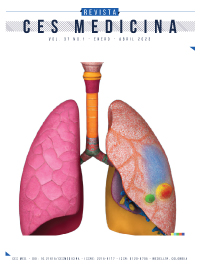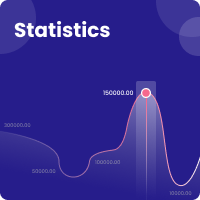Mutations in the PDGFRA, KIT, and KDR genes in patients with glioblastoma are associated with a worse outcome
DOI:
https://doi.org/10.21615/cesmedicina.7095Keywords:
Central Nervous System Neoplasms, overexpression, receptors tyrosina kinaseAbstract
Introduction: there are several Tyrosine Kinase Receptors that are involved in the development, growth and progression of tumor cells, for example, in glioblastomas it has been found that due to a possible linkage imbalance the PDGFRA, KIT and KDR genes, located in the arm length of chromosome 4 (4q11-q12), which could be related to the progression of this neoplasm. Objective: to report two clinical cases of patients diagnosed with glioblastoma and mutations in the PDGFRA, KIT, and KDR genes, and their relationship with a worse outcome. Clinical cases: this article presents the case of two patients with mutations in the genes, the result of a genetic panel that evaluated 324 genes and 37 gene fusions and accelerated clinical progression during the course of the disease. Conclusion: the changes produced in glioblastomas by mutations in receptor tyrosine kinases at the biological level describe a greater proliferative capacity of the tumor, which in the clinical setting has been evidenced as a worse prognosis for the patient, hence the need for have genetic panels that help identify the tumor profile and encourage more clinical studies related to drugs that target those receptors.
Downloads
References
Contreras LE. EPIDEMIOLOGÍA DE TUMORES CEREBRALES. Rev Médica Clínica Las Condes. mayo de 2017;28(3):332-8.
Ostrom QT, Cioffi G, Waite K, Kruchko C, Barnholtz-Sloan JS. CBTRUS Statistical Report: Primary Brain and Other Central Nervous System Tumors Diagnosed in the United States in 2014–2018. Neuro-Oncol. 5 de octubre de 2021;23(Supplement_3):iii1-105.
Louis DN, Perry A, Wesseling P, Brat DJ, Cree IA, Figarella-Branger D, et al. The 2021 WHO Classification of Tumors of the Central Nervous System: a summary. Neuro-Oncol. 2 de agosto de 2021;23(8):1231-51.
Wirsching HG, Galanis E, Weller M. Glioblastoma. En: Handbook of Clinical Neurology [Internet]. Elsevier; 2016 [citado 20 de enero de 2023]. p. 381-97. Disponible en: https://linkinghub.elsevier.com/retrieve/pii/B9780128029978000232
Radha V, Nambirajan S, Swarup G. Association of Lyn Tyrosine Kinase with the Nuclear Matrix and Cell-Cycle-Dependent Changes in Matrix-Associated Tyrosine Kinase Activity. Eur J Biochem. marzo de 1996;236(2):352-9.
Hubbard SR, Till JH. Protein Tyrosine Kinase Structure and Function. Annu Rev Biochem. junio de 2000;69(1):373-98.
Yuan J, Dong X, Yap J, Hu J. The MAPK and AMPK signalings: interplay and implication in targeted cancer therapy. J Hematol OncolJ Hematol Oncol. diciembre de 2020;13(1):113.
Yang Y, Li S, Wang Y, Zhao Y, Li Q. Protein tyrosine kinase inhibitor resistance in malignant tumors: molecular mechanisms and future perspective. Signal Transduct Target Ther. 17 de septiembre de 2022;7(1):329.
Milbury CA, Creeden J, Yip WK, Smith DL, Pattani V, Maxwell K, et al. Clinical and analytical validation of FoundationOne®CDx, a comprehensive genomic profiling assay for solid tumors. Vousden G, editor. PLOS ONE. 16 de marzo de 2022;17(3):e0264138.
Stupp R, Mason WP, van den Bent MJ, Weller M, Fisher B, Taphoorn MJB, et al. Radiotherapy plus Concomitant and Adjuvant Temozolomide for Glioblastoma. N Engl J Med. 10 de marzo de 2005;352(10):987-96.
Holtkamp N, Ziegenhagen N, Malzer E, Hartmann C, Giese A, von Deimling A. Characterization of the amplicon on chromosomal segment 4q12 in glioblastoma multiforme. Neuro-Oncol. 1 de julio de 2007;9(3):291-7.
Aldaz P, Arozarena I. Tyrosine Kinase Inhibitors in Adult Glioblastoma: An (Un)Closed Chapter? Cancers. 18 de noviembre de 2021;13(22):5799.
Nobusawa S, Stawski R, Kim YH, Nakazato Y, Ohgaki H. Amplification of the PDGFRA, KIT and KDR genes in glioblastoma: a population-based study: Neuropathology. diciembre de 2011;31(6):583-8.
Tilak M, Holborn J, New LA, Lalonde J, Jones N. Receptor Tyrosine Kinase Signaling and Targeting in Glioblastoma Multiforme. Int J Mol Sci. 12 de febrero de 2021;22(4):1831.
Disel U, Madison R, Abhishek K, Chung JH, Trabucco SE, Matos AO, et al. The Pan-Cancer Landscape of Coamplification of the Tyrosine Kinases KIT, KDR, and PDGFRA. The Oncologist. 1 de enero de 2020;25(1):e39-47
Gan HK, Cvrljevic AN, Johns TG. The epidermal growth factor receptor variant III (EGFRvIII): where wild things are altered. FEBS J. noviembre de 2013;280(21):5350-70.
Ozawa T, Brennan CW, Wang L, Squatrito M, Sasayama T, Nakada M, et al. PDGFRA gene rearrangements are frequent genetic events in PDGFRA -amplified glioblastomas. Genes Dev. 1 de octubre de 2010;24(19):2205-18.
Cismowski MJ. Tyrosine Kinase Inhibitors. En: xPharm: The Comprehensive Pharmacology Reference [Internet]. Elsevier; 2007 [citado 3 de octubre de 2022]. p. 1-4. Disponible en: https://linkinghub.elsevier.com/retrieve/pii/B9780080552323610049
Metibemu DS, Akinloye OA, Akamo AJ, Ojo DA, Okeowo OT, Omotuyi IO. Exploring receptor tyrosine kinases-inhibitors in Cancer treatments. Egypt J Med Hum Genet. diciembre de 2019;20(1):35.
Raizer JJ, Abrey LE, Lassman AB, Chang SM, Lamborn KR, Kuhn JG, et al. A phase II trial of erlotinib in patients with recurrent malignant gliomas and nonprogressive glioblastoma multiforme postradiation therapy. Neuro-Oncol. 1 de enero de 2010;12(1):95-103.
van den Bent MJ, Brandes AA, Rampling R, Kouwenhoven MCM, Kros JM, Carpentier AF, et al. Randomized Phase II Trial of Erlotinib Versus Temozolomide or Carmustine in Recurrent Glioblastoma: EORTC Brain Tumor Group Study 26034. J Clin Oncol. 10 de marzo de 2009;27(8):1268-74.
Gotink KJ, Verheul HMW. Anti-angiogenic tyrosine kinase inhibitors: what is their mechanism of action? Angiogenesis. marzo de 2010;13(1):1-14.
Carrato Mena A, Grande Pulido E, Guillén-Ponce C. Understanding the molecular-based mechanism of action of the tyrosine kinase inhibitor: sunitinib. Anticancer Drugs. enero de 2010;21(Supplement 1):S3-11.
Dreicer R. Management of side effects associated with sunitinib therapy for patients with renal cell carcinoma. OncoTargets Ther. marzo de 2009;51
Lindauer M, Hochhaus A. Dasatinib. En: Martens UM, editor. Small Molecules in Oncology [Internet]. Berlin, Heidelberg: Springer Berlin Heidelberg; 2014 [citado 3 de octubre de 2022]. p. 27-65. (Recent Results in Cancer Research; vol. 201). Disponible en: http://link.springer.com/10.1007/978-3-642-54490-3_2
Schiff D, Sarkaria J. Dasatinib in recurrent glioblastoma: failure as a teacher. Neuro-Oncol. 1 de julio de 2015;17(7):910-1.
Miklja Z, Yadav VN, Cartaxo RT, Siada R, Thomas CC, Cummings JR, et al. Everolimus improves the efficacy of dasatinib in PDGFRα-driven glioma. J Clin Invest. 31 de agosto de 2020;130(10):5313-25.
Li Y, Ali S, Clarke J, Cha S. Bevacizumab in Recurrent Glioma: Patterns of Treatment Failure and Implications. Brain Tumor Res Treat. 2017;5(1):1.
Brar HK, Jose J, Wu Z, Sharma M. Tyrosine Kinase Inhibitors for Glioblastoma Multiforme: Challenges and Opportunities for Drug Delivery. Pharmaceutics. 24 de diciembre de 2022;15(1):59.
Lee SY. Temozolomide resistance in glioblastoma multiforme. Genes Dis. septiembre de 2016;3(3):198-210.
Puputti M, Tynninen O, Sihto H, Blom T, Mäenpää H, Isola J, et al. Amplification of KIT, PDGFRA, VEGFR2, and EGFR in Gliomas. Mol Cancer Res. 1 de diciembre de 2006;4(12):927-34.
Downloads
Published
How to Cite
Issue
Section
License
Copyright (c) 2023 CES Medicina

This work is licensed under a Creative Commons Attribution-NonCommercial-ShareAlike 4.0 International License.
Derechos de reproducción (copyright)
Cada manuscrito se acompañará de una declaración en la que se especifique que los materiales son inéditos, que no han sido publicados anteriormente en formato impreso o electrónico y que no se presentarán a ningún otro medio antes de conocer la decisión de la revista. En todo caso, cualquier publicación anterior, sea en forma impresa o electrónica, deberá darse a conocer a la redacción por escrito.
Plagios, duplicaciones totales o parciales, traduccones del original a otro idioma son de responsabilidad exclusiva de los autores el envío.
Los autores adjuntarán una declaración firmada indicando que, si el manuscrito se acepta para su publicación, los derechos de reproducción son propiedad exclusiva de la Revista CES Medicina.
Se solicita a los autores que proporcionen la información completa acerca de cualquier beca o subvención recibida de una entidad comercial u otro grupo con intereses privados, u otro organismo, para costear parcial o totalmente el trabajo en que se basa el artículo.
Los autores tienen la responsabilidad de obtener los permisos necesarios para reproducir cualquier material protegido por derechos de reproducción. El manuscrito se acompañará de la carta original que otorgue ese permiso y en ella debe especificarse con exactitud el número del cuadro o figura o el texto exacto que se citará y cómo se usará, así como la referencia bibliográfica completa.
| Article metrics | |
|---|---|
| Abstract views | |
| Galley vies | |
| PDF Views | |
| HTML views | |
| Other views | |



